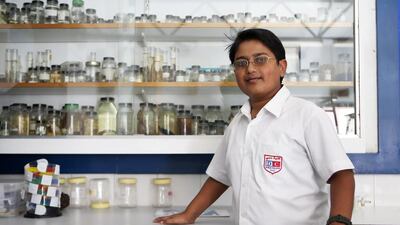ABU DHABI // Pupils are calibrating their ideas for science experiments in space.
With the deadline for the Genes in Space competition fast approaching, youngsters are working on improving their concepts for experiments that will help them understand the effects of low gravity on the building blocks of life.
Youngsters are hoping this could prove beneficial for the health of astronauts on prolonged space missions, as well as providing insight into how to fight cancer here on Earth.
As part of The National Space Programme contest, high school pupils are being challenged to come up with an idea for a DNA experiment that takes advantage of low gravity in orbit.
The winning pupils will travel to the United States to watch their experiment launched to the International Space Station, where astronauts will conduct it.
“The competition gives you a chance to come up with an entirely new idea which could help change the world,” said 12-year-old Pritvik Sinhadc.
The Dubai College eighth grader said his experiment would look into the effects of radiation in space on cancer cells, which he hoped would contribute to a cure for cancer.
“Being able to create an experiment in space has immense potential, and will allow me to dive deeper into the subjects I am interested in,” he said.
Having worked on his project for months, Pritvik said research for his proposal had given him a greater understanding of numerous topics including space sciences, genetics, cancer research, microgravity and cosmic radiation.
Focusing on the health ramifications of long-term space travel, 14-year-old Gems Modern Academy pupil Karun Isaac said his experiment would look into how space environment effects astronauts’ neuron cells.
An eight-year study using genetically-engineered mice, conducted in Nasa’s Space Radiation Laboratory in Long Island, New York City, found that cosmic radiation accelerated the onset of Alzheimer’s disease, a neurodegenerative disease.
“It is a proven fact that conditions in space cause neurodegeneration,” said Karun.
“Looking deeper into this is key because it affects the mental health of astronauts and we need to make sure they have adequate cognitive facilities at all times.”
Karun said the competition offered a one of a kind opportunity to meaningfully contributing to space research.
“This experience has taken me beyond the text book, and I feel it is something that will benefit everyone,” he said.
A spokesman for Adec said competitions such as Genes in Space created a culture of innovation which encouraged pupils to create, and experiment.
“Students get a chance to witness innovation first-hand, as well as gain hands-on experience of some of the latest trends and techniques out there,” said the spokesman.
This and other science competitions are important in the development of science, technology, and maths subjects – a top priority for Adec.
Submissions are now being accepted for Genes in Space from pupils in Grades 7 to 12 at genesinspace.org.
The deadline for submissions is October 7.
To find out more and get involved follow #genesinspaceuae on social media or visit thenational.ae/uae/genes-in-space.
tsubaihi@thenational.ae

